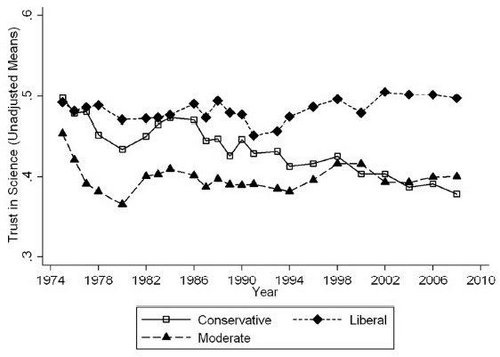否定論・陰謀論を信じる理由
Gauchat[2012]は総合社会調査データに基づき、国民の科学への信頼の推移を調べ、保守だけが科学への信頼を低下させてきたことを検証した。
Gauchat[2012]は総合社会調査データに基づき、国民の科学への信頼の推移を調べ、保守だけが科学への信頼を低下させてきたことを検証した。
This study explores time trends in public trust in science in the United States from 1974 to 2010. More precisely, I test Mooney’s (2005) claim that conservatives in the United States have become increasingly distrustful of science. Using data from the 1974 to 2010 General Social Survey, I examine group differences in trust in science and group-specific change in these attitudes over time. Results show that group differences in trust in science are largely stable over the period, except for respondents identifying as conservative. Conservatives began the period with the highest trust in science, relative to liberals and moderates, and ended the period with the lowest. The patterns for science are also unique when compared to public trust in other secular institutions. Results show enduring differences in trust in science by social class, ethnicity, gender, church attendance, and region. I explore the implications of these findings, specifically, the potential for political divisions to emerge over the cultural authority of science and the social role of experts in the formation of public policy.これは、「国民を教育し、科学知識を与えることで、科学への信頼が高められる」という欠如モデルが成立していないことを再確認するとともに、「社会集団によらず科学への信頼を低下させている」という疎外モデルも正しくないことを示している。
本研究は、1974〜2010年の米国における国民の科学への信頼の時間トレンドを探求したものである。さらに、正確には、私は「米国における保守が私大に科学を眞楽しなくなってきた」というMooney(2005)の主張を検証する。1974〜2010年の総合社会調査の結果を使って、私は集団間の科学への信頼度の違いと、集団特有の時間変化を調べた。結果は、科学への信頼に関する集団間の差異は、この期間では概ね安定しているが、保守の回答者たちはそうではなかった。この期間の最初では、リベラルや中間よりも、保守の科学への信頼は高かったが、この期間の最後には最下位になっていた。他の世俗分野への国民の信頼と比べると、科学への信頼だけが傾向が違っていた。また、社会階層や民族やジェンダーや教会に通う率や宗教による差異は変化していなかった。私は、科学の文化的権威から生じる政治的対立と、公共政策形成におけるエキスパートの社会的役割に対する、ここでの知見の意味することを探求する。
Mooney, Chris. 2005. The Republican War on Science. New York: Basic Books
>[ Gordon Gauchat: "Politicization of Science in the Public Sphere: A Study of Public Trust in the United States, 1974 to 2010", American Sociological Review 77(2) 167–187 ]
The cultural ascendency thesis predicts a uniform increase in public trust in science across all social groups. In other words, the special congruence of science and modern institutions increases the need for scientific knowledge and public education, which, in turn, encourages public trust in science (Barber 1990; Parsons 1962; Whitehead 1946).保守・リベラルというポジションが、科学への信頼度に主として影響している以上は、より高い知識・教養を持つ保守は、より科学への信頼が低くなることになる。
By contrast, scholars have predicted a uniform decline in public trust across all social groups, or the alienation thesis. This decline in public trust is associated with a cultural backlash against technocratic authority and science’s inability to defend itself against its own standards in public discourse (Beck 1992; Holton 1993).
Finally, the politicization thesis predicts that ideological conservatives will experience group-specific declines in trust in science over time. Conservatives’ distrust is attributable to the political philosophy and intellectual culture accompanying the NR[new right] and the increased connection between scientific knowledge and regulatory regimes in the United States, the latter of which conservatives generally oppose.
文化的上昇[あるいは欠如モデル]は、国民の科学への信頼が社会集団を問わず向上すると予測する。言い換えるなら、科学と現代の制度の特別な調査には、科学知識と国民教育がより必要となり、それは国民の科学への信頼を高める。
これに対して、学者たちは社会集団を問わず、国民の科学への信頼は低下すると予測する。すなわち疎外。この国民の信頼の低下は、テクノクラート的権威に対する文化的反動及び、国民の論議における基準に対して自らを擁護できない科学に伴うものである。
最後が政治化である。これはイデオロギー的保守が時間とともに、集団として科学への信頼を低下させてきたというもの。保守の科学への不信は、ニューライトの政治哲学と知的文化や、米国における科学知識と法規制の関連性の増大によるものである。この法規制に保守は反対している。
Figure 1. Unadjusted Means of Public Trust in Science for Each Survey Year by Political Ideology (Note: Figure shows three-year moving averages for each group, which smooth the patterns overtime.)
Barber, Bernard. 1990. Social Studies of Science. New Brunswick, NJ: Transaction Publishers
Beck, Ulrich, 1992. Risk Society: Towards a New Modernity. London, UK: Sage
Holton, Gerald. 1993, Science and Anti-Science, Cambridge, MA; Harvard University Press.
Parsons, Talcott. 1962. “The Institutionalization of Scientific Investigation.” Pp. 7–15 in The Sociology of Science, edited by B. Barber and W. Hirsch. Glencoe, IL: Free Press
Whitehead, Albert North. 1946. Science and the Modern World: Lowell Lectures. London: Scientific Book Club.
[ Gordon Gauchat: "Politicization of Science in the Public Sphere: A Study of Public Trust in the United States, 1974 to 2010", American Sociological Review 77(2) 167–187 ]
Using predicted probabilities derived from this model, we see that conservatives with high school degrees, bachelor’s degrees, and graduate degrees all experienced greater distrust in science over time and these declines are statistically significant. In addition, a comparison of predicted probabilities indicates that conservatives with college degrees decline more quickly than those with only a high school degree. These results are quite profound, because they imply that conservative discontent with science was not attributable to the uneducated but to rising distrust among educated conservatives. Put another way, educated conservatives appear to be more culturally engaged with the ideology and, in Martin and Desmond’s (2010) terms, more politically sophisticated.
Martin, John Levi and Matthew Desmond. 2010. “Political Position and Social Knowledge.” Sociological Forum 25:1–26.
[ Gordon Gauchat: "Politicization of Science in the Public Sphere: A Study of Public Trust in the United States, 1974 to 2010", American Sociological Review 77(2) 167–187 ]



コメントをかく